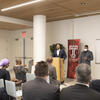Leading the Charge
Molefi Kete Asante, renowned professor, prolific author, and former chair of the Department of Africology and African American Studies, worked with colleagues to create the center. In October of 2021, Timothy Welbeck, attorney, professor, scholar and hip-hop artist, was chosen to direct the center based on his extensive professional experience of advocating for the rights of marginalized people. The center aims to
- produce unique scholarship that shapes public discourse,
- educate the Temple and surrounding communities about all forms of racism, and
- creatively and collectively work on solutions to mitigate the harm caused by racism and white supremacy.
The center’s vision includes being an ally to other marginalized groups and fighting antisemitism, the anti-LGBTQ faction and attacks on Black women specifically.
In August of 2022, the Center for Anti-Racism moved from the College of Liberal Arts to Temple’s office of Institutional Diversity, Equity, Advocacy and Leadership (IDEAL) to leverage the natural affinity between the two university units. Here, the center’s work can benefit from greater visibility while helping to support the office’s commitment to diversity.


